10.5 simulated match
Posted yodel
tags:
篇首语:本文由小常识网(cha138.com)小编为大家整理,主要介绍了10.5 simulated match相关的知识,希望对你有一定的参考价值。
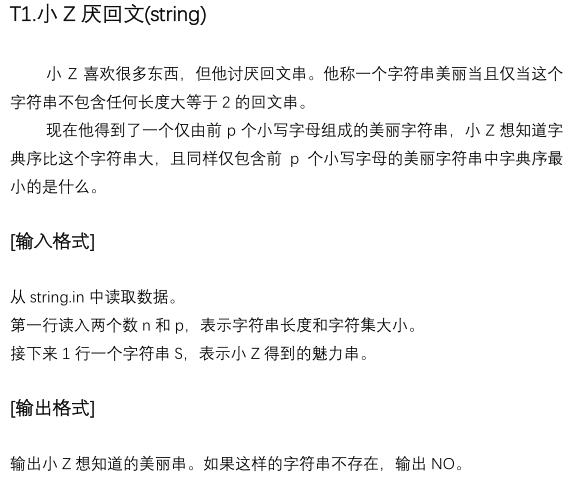

well,the code is the best language
#include<cstdio> using namespace std; #define ct register int #define fr(a,b,c) for(ct a=b;a<=c;a++) #define init(a) freopen(a".in","r",stdin);freopen(a".out","w",stdout); int read(){ct f=1,x=0;char c=getchar(); for(;c<\'0\'||c>\'9\';c=getchar())if(c==\'-\')f=-1; for(;\'0\'<=c&&c<=\'9\';c=getchar())x=(x<<1)+(x<<3)+(c^48);return x*f;} char st[100005];int n,p; //st:string //n:the length of string //p:the section of choosable lectures void Build(int x){ fr(i,x,n)//make a loop from x to n fr(j,0,p-1)//make a loop : 0<j<p if((i<=1||j!=st[i-1]-\'a\')&&(i<=2||j!=st[i-2]-\'a\'))//this judge is same with the judge below {st[i]=j+\'a\';break;}//if need change just change it to avoid the parlindrome_case printf("%s",st+1);//after operating ,just out the solution } int main(){init("string"); n=read();p=read();//read the length of string and the section of choosable lectures scanf("%s",st+1);//read the string for(ct i=n;i;--i)//make a loop from n to 1,this is a greedy part, //if we find choosable case,it\'s easy to prove it\'s the best solution(smallest Lexicographic order) fr(j,st[i]-\'a\'+1,p-1)//here,we set a as 0 and we can make a loop against choosable lectures if((i<=1||j!=st[i-1]-\'a\')&&(i<=2||j!=st[i-2]-\'a\'))//here we make a judge,in order to cut some unnecessary operation //if i==1,just means that it can\'t be same with lectures before(OF COURSE),just make operation //or if the location is bigger than 1,just means that there is at least one lecture before it,in this case we //need to check it with a palindrome_case .for example:aa,it\'s a palindrome ,so we can\'t operate it //another case is that the location is bigger than 2,just means that there is at least two lectures before it, //in this case ,we need to check it with a palindrome_case. for example:aba,it\'s a palindrome ,so we can\'t operate it {st[i]=j+\'a\';Build(i+1);return 0;}//just change it and then try to work on it,and judge the lectures behind //so that we can work out a pretty_string puts("NO");return 0;//if we can\'t work out the pretty_string //this solution has two case //1:the given_lecture_section can\'t satisfy a pretty_string(most possible) //2:the given string is not pretty_string (may impossible) }
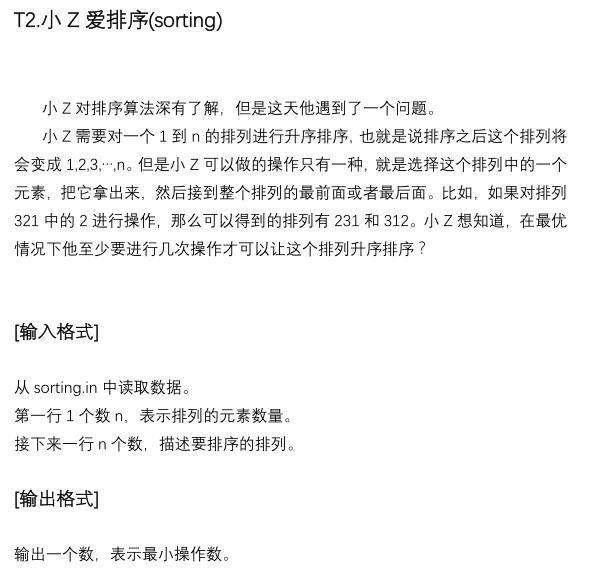
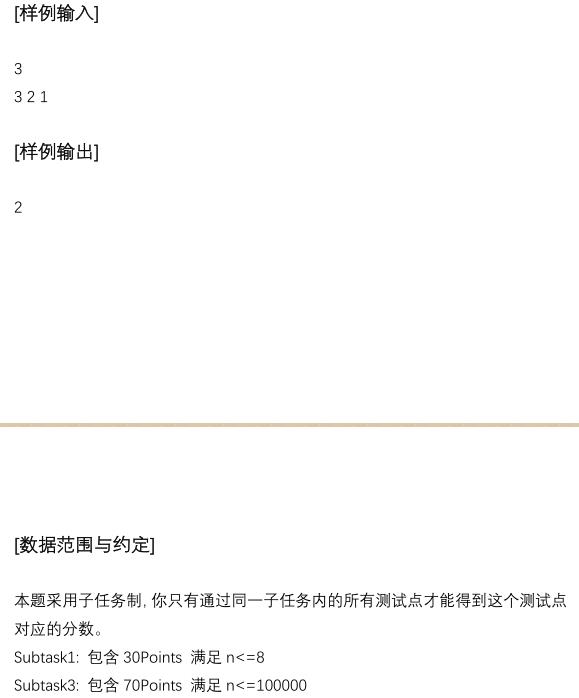
well,the code is the best language
#include<cstring> #include<cstdio> #define MN 100000 using namespace std; #define ct register int #define fr(a,b,c) for(ct a=b;a<=c;a++) #define init(a) freopen(a".in","r",stdin);freopen(a".out","w",stdout); int read(){ct f=1,x=0;char c=getchar(); for(;c<\'0\'||c>\'9\';c=getchar())if(c==\'-\')f=-1; for(;\'0\'<=c&&c<=\'9\';c=getchar())x=(x<<1)+(x<<3)+(c^48);return x*f;} int n,lt=0,f[100005];//lt:longest_length int main(){init("sorting");n=read();//read the total_number of the array int x,ans=0; fr(i,1,n)//make a loop from 1 to n ,to read the array x=read(),ans=ans>f[x-1]+1?ans:f[x-1]+1,f[x]=f[x-1]+1; //read the array ,if the longest_length can make better,just renew it.mark the length //here ,we use a greedy algorithm,we need to find a longest_strict_increasing_part, //this part we don\'t need to change it ,for example:2345 among 7234516 is the longest //we only need to change other number\'s location ,and it\'s easy to prove this is the best solution //why :f[x]=f[x-1]+1? if a section is incremental,the sum before it must have been marked //pay attention to the problem ,the array includes 1~n, //so if a section is incremental,it must be look like 2345 or 5678 so that we don\'t need to change it to make it ordered //for example:1 5 6 2 3 4 //f[5]=1 because it can\'t form a incremental section,f[6]=2 because it can form a incremental section:5,6 //Similarly f[2]:1 f[4]:3;in this way,we can easily work out the length of the increasing_section\'s length including x by now printf("%d",n-ans);return 0;//then the operation_time is just n-ans }
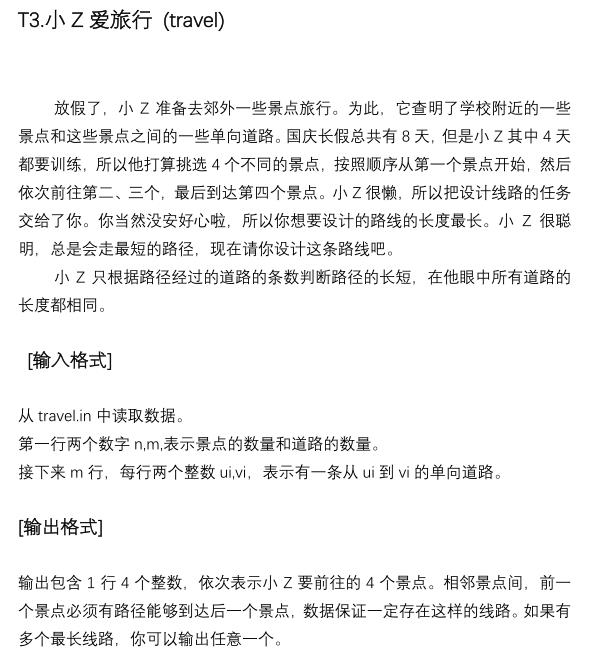
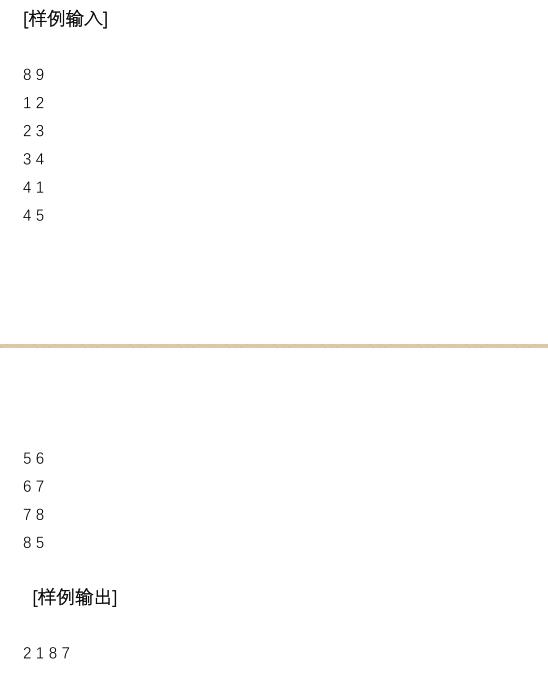
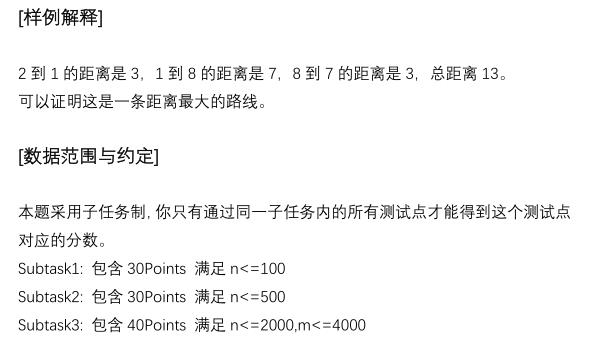
well ,the code is the best language
//!!!pay attention here!!! //!!!in this program,we use A,B,C,D to replace the wanted_four_sites!!! //!!!in this way,we can think of the program more intuitively!!! #include<cstring> #include<cstdio> #define MN 2000 using namespace std; #define ct register int #define fr(a,b,c) for(ct a=b;a<=c;a++) #define init(a) freopen(a".in","r",stdin);freopen(a".out","w",stdout); #define b() fr(i,1,n)fr(j,1,n)if(i!=j&&d[i][j]<1e9) int read(){ct f=1,x=0;char c=getchar(); for(;c<\'0\'||c>\'9\';c=getchar())if(c==\'-\')f=-1; for(;\'0\'<=c&&c<=\'9\';c=getchar())x=(x<<1)+(x<<3)+(c^48);return x*f;} int head[MN+5],cnt=0,n,m,d[MN+5][MN+5],q[MN+5],top,ans,a[4]; int mx[3][MN+5],from[3][MN+5],Mx[3][MN+5],From[3][MN+5]; //from/From(from_a_to_b and from_b_to_a):the_point_which_the_road_against of three longest road //mx/Mx(from_a_to_b and from_b_to_a):the three longest road //why we need to save respectively,because it\'s an oriented graph struct edge{int to,next;}e[MN*2+5]; inline void ins(int f,int t){e[++cnt].to=t,e[cnt].next=head[f],head[f]=cnt;} //ins:insert,use this to add an edge from f to t //head[] used to mark the edge_from_f\'s location in e[] void add(int fromm[][MN+5],int mxx[][MN+5],int x,int y,int len){ //fromm:the_point_which_the_road_against of three longest road //mxx:the three longest road //x:from y:to len:the given_distance if(len>mxx[0][x])//if the max_length can make better fromm[2][x]=fromm[1][x],mxx[2][x]=mxx[1][x],//save the before_one to replace the next_one(*) fromm[1][x]=fromm[0][x],mxx[1][x]=mxx[0][x],//the same operation fromm[0][x]=y,mxx[0][x]=len;//renew the longest one //here we use fromm[0]~[2][x] respectively save the longest one ,second_longest one,third_longest one. //in this way ,we can improve the efficiency in the next few operations else if(len>mxx[1][x])//or ,just means that the given_distance is smaller than longest one //just try to renew the second_longest one,if can make better,just make it better fromm[2][x]=fromm[1][x],mxx[2][x]=mxx[1][x],//the same operation fromm[1][x]=y,mxx[1][x]=len;//renew the second_longest one else if(len>mxx[2][x])//or ,just means that the given_distance is smaller than the second_longest one //just try to renew the third_longest one,if can make better,just make it better fromm[2][x]=y,mxx[2][x]=len;//just renew it,because we only save three longest distance,and it\'s the last one, //so we don\'t need any change like before } inline void R(int A,int B,int C,int D,int res){if(res>ans) ans=res,a[0]=A,a[1]=B,a[2]=C,a[3]=D;} int main(){ init("travel");n=read();m=read();memset(d,63,sizeof(d)); //read the total_number of sites,and the total number of roads.Then initializate the array:d ct st,fn;fr(i,1,m)st=read(),fn=read(),ins(st,fn);//read each road\'s starting point and the finishing point //and then insert this edge //----------------------------------------------------------------------------------------------------- fr(i,1,n){//make a loop from 1 to n d[i][q[top=1]=i]=0;//set queue_top as 1 and make queue[1] as i and then make distance[i][i] as 0 //-_-..of course,visit oneself need distance? fr(j,1,top)//make a loop from 1 to top for(ct k=head[q[j]];k;k=e[k].next)//visit every edge started from queue[j] if(d[i][q[j]]+1<d[i][e[k].to])//if the distance can make smaller d[i][q[++top]=e[k].to]=d[i][q[j]]+1;}//just push it to the queue and renew it\'s distance //!!!why we do this!!! //!!!against this problem ,there are two query:longest among smallest!!! //------------------------------------------------------------------------------------------------------ //b():fr(i,1,n)fr(j,1,n)if(i!=j&&d[i][j]<1e9) //that means 1<=i<=n,1<=j<=n;if this road is not against oneself and it has distance(just has possible road between them) //here ,we regard i as B,and j as C b()add(From,Mx,j,i,d[i][j]),add(from,mx,i,j,d[i][j]); //if satisfy,just respectively work out three_longest_distance from C to B and from B to C //and then respectively mark the three_lonest_way into the From,Mx and from,mx //---------------------------------------------------------------------------------------------------- //by now, we have work out the choose_possible_section already(against B and C) //and then we need to enumerate A and D.this work is easy,but you should know that we can\'t make them the same b()fr(k,0,2)if(From[k][i]!=j&&From[k][i]) //if satisfy,just means that they are possible and we have work out the possible_section of them already //depend on this,just make a loop 0<=k<=2 to enumerate the three_longest_distance from C to B //then make a judge:(here we expect From[k][i] as A,j as C)if A has been marked and A is not same with C //just means this A satisfies the limiting_condition(can\'t be same as others) fr(l,0,2)//make a loop 0<=l<=2,to enumerate the three_longest_distance form B to C if(from[l][j]!=i&&from[l][j]!=From[k][i]&&from[l][j]) //make a judge:(here we expect from[l][j] as D,i as B)if D is not B,and D is not same as A and D has been marked R(From[k][i],i,j,from[l][j],Mx[k][i]+d[i][j]+mx[l][j]);//just mark the answer printf("%d %d %d %d",a[0],a[1],a[2],a[3]);return 0;//out the answer }
以上是关于10.5 simulated match的主要内容,如果未能解决你的问题,请参考以下文章